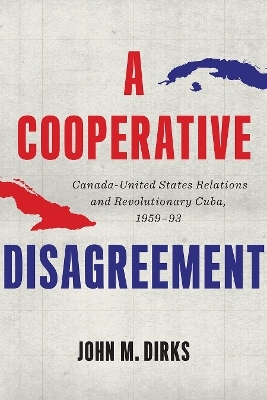
A Cooperative Disagreement
Canada-United States Relations and Revolutionary Cuba, 1959–93
Seiten
2022
University of British Columbia Press (Verlag)
978-0-7748-6580-7 (ISBN)
University of British Columbia Press (Verlag)
978-0-7748-6580-7 (ISBN)
Agree to disagree? A Cooperative Disagreement demonstrates how Canada and the United States – neighbours by geography and close allies by design – successfully kept their differences over revolutionary Cuba from permanently damaging their relationship.
A Cooperative Disagreement demonstrates how Canada and the United States successfully kept divergent policies on revolutionary Cuba from damaging their bilateral relationship. Covering the period from 1959 to the end of the Cold War, John Dirks investigates the efforts of Canadian and US diplomats and bureaucrats to cooperate despite their respective approaches toward Cuba. Washington sought the downfall of the communist regime through political and economic isolation. Ottawa chose engagement instead. The burden fell largely on Canada, as the smaller power, to mitigate potential frictions. Ultimately, these two North American powers continued to adhere to the hard policy boundaries set by their own governments while establishing a mutually beneficial relationship on issues of intelligence, travel, and other areas of engagement with Cuba. Drawing on archival documents from both sides of the border, many newly declassified, this comprehensive study reveals how officials in Ottawa and Washington managed to preserve bilateral harmony despite ongoing policy divergence
A Cooperative Disagreement demonstrates how Canada and the United States successfully kept divergent policies on revolutionary Cuba from damaging their bilateral relationship. Covering the period from 1959 to the end of the Cold War, John Dirks investigates the efforts of Canadian and US diplomats and bureaucrats to cooperate despite their respective approaches toward Cuba. Washington sought the downfall of the communist regime through political and economic isolation. Ottawa chose engagement instead. The burden fell largely on Canada, as the smaller power, to mitigate potential frictions. Ultimately, these two North American powers continued to adhere to the hard policy boundaries set by their own governments while establishing a mutually beneficial relationship on issues of intelligence, travel, and other areas of engagement with Cuba. Drawing on archival documents from both sides of the border, many newly declassified, this comprehensive study reveals how officials in Ottawa and Washington managed to preserve bilateral harmony despite ongoing policy divergence
John M. Dirks is a historian and professional archivist. Now with the City of Toronto, he taught for several years in the International Relations Program at Trinity College, University of Toronto.
Foreword / Robert Bothwell and John English
Introduction
1 Setting Precedents in Latin America
2 From Parallel Paths to Parting Ways
3 The Era of Friction Begins
4 Establishing Cooperation amid Tension
5 Refinement through Fire
6 Normalizing Cooperation, Containing Subversion
7 A Heightened Potential for Friction
8 The Routinization of Difference
9 From the Summit to Square One
10 To the End of the Cold War … and Beyond
Conclusion
Notes; Selected Bibliography; Index
| Erscheinungsdatum | 01.08.2022 |
|---|---|
| Reihe/Serie | The C.D. Howe Series in Canadian Political History |
| Verlagsort | Vancouver |
| Sprache | englisch |
| Maße | 152 x 229 mm |
| Gewicht | 640 g |
| Themenwelt | Sozialwissenschaften ► Politik / Verwaltung ► Politische Theorie |
| Sozialwissenschaften ► Politik / Verwaltung ► Staat / Verwaltung | |
| Sozialwissenschaften ► Politik / Verwaltung ► Vergleichende Politikwissenschaften | |
| ISBN-10 | 0-7748-6580-6 / 0774865806 |
| ISBN-13 | 978-0-7748-6580-7 / 9780774865807 |
| Zustand | Neuware |
| Haben Sie eine Frage zum Produkt? |
Mehr entdecken
aus dem Bereich
aus dem Bereich
Der »progressive« Angriff auf Israel, Judentum und …
Buch | Softcover (2024)
edition TIAMAT (Verlag)
28,00 €
ein Vortrag
Buch | Softcover (2024)
Suhrkamp (Verlag)
10,00 €


